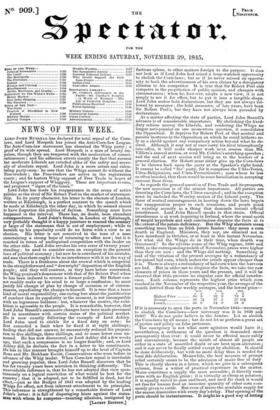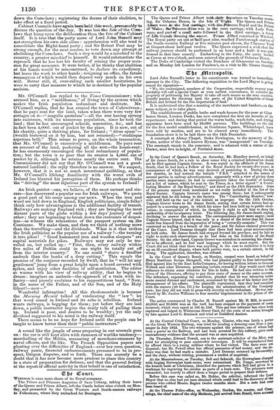NEWS OF THE WEEK.
LORD JOHN Russnu, has declared for total repeal of the Corn- laws, and Lord Morpeth has joined the Anti-Corn-law League. The Anti-Corn-law movement has absorbed the Whig party ; a proof of its wide spread. Lord Morpeth is a man of hearty im- pulses, though they are tempered with the moderation of consci- entiousness; and his adhesion attests simply the fact that earnest but moderate Liberals are satisfied alike of the safety and neces- sity of absolute repeal. Lord John is a more astute and calcu- lating party-man : he sees that the Whigs cannot do without the Free-traders ; the Free-traders are active in the registration courts; and he barters Whig support of Free Trade in hopes of the League's support of Whiggery. These are important events, and pregnant signs of the times."
Lord John has made his reappearance in the arena of active politics as the rival of Sir Robert Peel in the market of statesman- ship. In its party character, his letter to the electors of London, written at Edinburgh, is a perfect contrast to the speech which he made at Edinburgh the other day, in which he seemed almost to have forgotten the politics of faction. , Something must have happened in the interval. There has, no doubt, been abundant correspondence. Lord John's friends, in London or Edinburgh, very probably thought-it a happy juncture to remind the country at large of the statesman that is out of employment; while to burnish up his popularity could do no harm with a view to an election. His letter is not conceived in the tone of a man entertaining a strong hope of returning to office now; • but it is couched in terms of undisguised competition with the leader on the other side. Lord John revokes his own error of twenty years' standing : he used to consider corn an exception to the general laws of political economy ; but now he is convinced of his mistake, and sees that there ought to be no interference with it in the way of trade. There is a frankness about the avowal which is congenial to the straightforward and "downright" disposition of the English people ; and they will contrast, as they have before contrasted, the Whig penitent's demeanour with that of Sir Robert Peel when he has been induced to reverse a former policy. Sir Robert can- not readily make up his mind to so large a confession : he must justify his change of plan by change of occasion or of circum- stances, repudiating the change in himself. It is true that a laxer kind of moral responsibility, one caring less about the justification of conduct than its popularity at the moment, is not incompatible with an ingenuous boldness : but, whatever the motive, the exhi- bition is agreeable to the people. It is remarkable, however, that Lord John Russell's successive changes have been made piecemeal and in accordance with certain states of the political market. He is now exactly following the example of Lord Ashley. Lord John used to stickle for a fixed duty on corn : he first conceded a limit when he fixed it at eight shillings ; finding that did not answer, he successively reduced his proposi- tion to five shillings, three shillings, and to some lower sum un- named. He has now discovered, as Lord Ashley did a few weeks ago, that such a compromise is no longer feasible ; and, as Lord .Ashley did, he declares the fact in a letter to his constituents. He has in like manner brought himself up to the level of Captain Rom and Mr. Bickham Escott, Conservatives who were before in advance of the Whig leader. When Corn-law repeal is inevitable and growing popular, then Lord John Russell discovers that lie has for twenty years been mistaken in thinking differently. The unavoidable inference is, that he has not adopted that view spon- taneously on a logical conviction of what would be best for the Country; that it is adopted, not to be fulfilled in deed, but for effect,—just as the Budget of 1841 was adopted by the leading Whigs for effect, not from inherent attachment to its principles. This inference is strengthened by a remarkable feature of Lord John's letter : it is full of disparaging hints against the states- man with whom he competes—taunting allusions, instigated by factious spleen' to other matters foreign to the purpose. It does not look as if Lord John had seized a long-watched opportunity to abolish the Corn-laws ; but as if he never missed an opportu- nity to back the advertisement of his own claims by a derogatory allusion to his competitor. It is true that Sir Robert Peel also competes in the propitiation of public opinion, and changes with circumstances : when he, however, adopts a new view, it is not simply to use it for effect, but to put it into a tangible shape. Lord John makes bold declarations, but they are not always fol- lowed by measures : the bold measures, of late years, have been Sir Robert Peel's, but they have not always been preceded by declarations.
As a matter affecting the state of parties, Lord John Russell's advance is of considerable importance. By abolishing the fixed- duty schism among the Liberals, and rendering the Whigs no longer anti-popular on one momentous question, it consolidates the Opposition. It deprives Sir Robert Peel of that neutral and passive inertness in the Opposition on which he could hitherto re- ly as a shield against any compulsory action beyond what he de- sired. Although it may not at once carry his rival triumphantly into office, it will make sharper work next session than Mr. Villiers's annual motion, or even Mr. Cobden's searching speeches ; and the end of next session will bring us to the borders of a general election. Sir Robert must either give up the Corn-laws or be thrown back upon the party at the Speaker's right hand. It cannot be called "his" party, for it comprises the Ultra-Toriee, Ultra-Religionists, and Ultra-Protectionists ; men whom he has so often bearded, that there would be some humiliation in accepting succour from them.
As regards the general question of Free Trade and its prospects, the new accession is of the utmost importance. All parties are deserting the Corn-laws, the Ultras excepted ; and in the exception must be included the Worsley section of the Liberal party. The furor of mutual encouragement in hooting down the laws begets the exaggeration proper to such occasions, and people point to existing scarcity as a thing that demands instant official interference. Lord John Russell speaks in that strain. Official interference is at work inquiring in Ireland, where the usual spirit of turgid hyperbole and rash conclusions disguise the facts as to thtent of the potato deficiency. But the Whig alarmists mean something more than an Irish potato famine: they mean a corn dearth in England. Ministers, they say, are criminal not to have interfered in October, or at least in this instant November. Yet what did the Whigs do in their time, when dearth was threatened ? In the adverse years of the Whig regime, 1838 and 1839, in the corresponding month of November, prices were higher than they are now ; and the Whigs did nothing. Something is said of the vitiation of the present averages by a redundancy of low-priced bad corn, which makes the article appear cheaper than it is. There is always a redundancy of bad corn when the harvests are bad. But in order not to disguise the facts, we take the raw elements of prices in those years and the present, and it will be observed that 1845 presents no singular case for official interfer- ence. Each column represents the highest price which corn reached in the November of the respective year, the average of the month derived from the weekly averages, and the lowest price-
1838.Ibis. 1813.
s d
8. d. 8 d.
Highest Price 80 0 82 0 79 0 Average 66 7i 67 5 Lowest 63 0 54 0 57 I If 54 0
If it is necessary to open the ports in November 1845—necessary to abolish the Corn-laws—how necessary was it in 1838 and 1839! We do not quite believe in the famine. Let us abolish the Corn-laws by all means ; but do not let us perform a great act of justice and policy on false pretences. The emergency is not what mere agitators would have it ; nevertheless, a settlement of the question is demanded more peremptorily than ever : it could never be effected more safely and conveniently, because the minds of almost all people are either in a state of unsettled doubt or are bent upon alteration; and it can never be finally settled except by abolition. It should be done deliberately, but with no more delay than is needed for bond fide deliberation. Meanwhile, the best measure of prompt relief certainly seems to be the admission of maize free of duty This is clearly shown in a letter, which we give in a subsequent column, from a writer of practical experience in the matter. Maize constitues a supply the most accessible ; it directly com- petes with no English grain ; it is virtually as cheap as potatoes; it is equally suited to man and beast, and used for stock it woulci set free for human food an immense quantity of other corn com- monly given to cattle. But even of maize the available supply for the season diminishes with every day's delay. That opening of the ports should be instantaneous. It might be a good way of letting
down the Corn-laws ; registering the decree of their abolition, to take effect at a fixed period.
Cabinet Councils haveagainbaluilizeld thirweek,..presumabirto discuss the question of the day. lit was less tithe fate of the Corn- laws that hung upon the deliberation ...than the fate Of the Cabinet itself. It is true that theparty move of Lord John 'Russell may not strengthen his own side alone : apprehension will also tend to consolidate the Right-hand party ; and Sir Robert Peel may be strong enough, for the next session, to vote down any attempt at abolishing the Corn-laws. Such a step would be a mischief to the country, a greater mischief to himself. It would substantiate the reproach that he has lost his faculty of seizinr, the proper occa- sion for great measures. It were better, if he thinks that abolition at his hands would be misconstrued, to declare its expediency, but leave the work to other hands • resigning an office, the future resumption of which would then depend very much on his own will. Better still, if, over-riding such smaller hesitations he were to carry that measure to which he is destined by the popular acclaim.



























